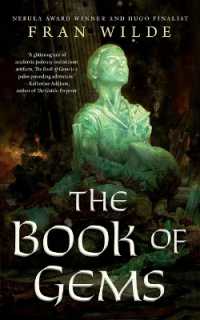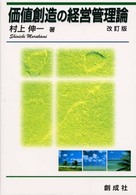基本説明
Crossing boundaries between and among disciplines such as linguistics, psychology, philosophy, or anthropology forms a creative platform in a bold attempt to reveal the complex interaction of language, culture and cognition in the context of human communication and interaction. Contributions by R. W. Langacker et al.
Full Description
This is an interdisciplinary volume that focuses on the central topic of the representation of events, namely cross-cultural differences in representing time and space, as well as various aspects of the conceptualisation of space and time. It brings together research on space and time from a variety of angles, both theoretical and methodological. Crossing boundaries between and among disciplines such as linguistics, psychology, philosophy, or anthropology forms a creative platform in a bold attempt to reveal the complex interaction of language, culture, and cognition in the context of human communication and interaction.
The authors address the nature of spatial and temporal constructs from a number of perspectives, such as cultural specificity in determining time intervals in an Amazonian culture, distinct temporalities in a specific Mongolian hunter community, Russian-specific conceptualisation of temporal relations, Seri and Yucatec frames of spatial reference, memory of events in space and time, and metaphorical meaning stemming from perception and spatial artefacts, to name but a few themes.
The topic of space and time in language and culture is also represented, from a different albeit related point of view, in the sister volume Space and Time in Languages and Cultures: Linguistic diversity (HCP 36) which focuses on the language-specific vis-à-vis universal aspects of linguistic representation of spatial and temporal reference.
Contents
1. Editors and contributors; 2. Foreword: Space and time in languages, cultures, and cognition (by Jaszczolt, Katarzyna M.); 3. Introduction: Linguistic, cultural, and cognitive approaches to space and time (by Filipovic, Luna); 4. Part I. Linguistic and conceptual representation of events; 5. 1. Event-based time intervals in an Amazonian culture (by Silva Sinha, Vera da); 6. 2. Vagueness in event times: An epistemic solution (by Huang, Minyao); 7. 3. Aspectual coercions in content composition (by Asher, Nicholas); 8. 4. Back to the future: Just where are forthcoming events located? (by Wallington, Alan M.); 9. Part II. Cultural perspectives on space and time; 10. 5. The "Russian" attitude to time (by Apresjan, Valentina); 11. 6. Two temporalities of the Mongolian wolf hunter (by Charlier, Bernard); 12. 7. Koromu temporal expressions: Semantic and cultural perspectives (by Priestley, Carol); 13. 8. Universals and specifics of 'time' in Russian (by Gladkova, Anna); 14. Part III. Conceptualizing spatio-temporal relations; 15. 9. Linguistic manifestations of the space-time (dis)analogy (by Langacker, Ronald W.); 16. 10. Vectors and frames of reference: Evidence from Seri and Yucatec (by Bohnemeyer, Jurgen); 17. 11. Verbal and gestural expression of motion in French and Czech (by Fibigerova, Katerina); 18. 12. Language-specific effects on lexicalisation and memory of motion events (by Filipovic, Luna); 19. 13. Space and time in episodic memory: Philosophical and developmental perspectives (by Russell, James); 20. 14. Conceptualizing the present through construal aspects: The case of the English temporal constructions (by Drozdz, Grzegorz); 21. 15. From perception of spatial artefacts to metaphorical meaning (by Johansson Falck, Marlene); 22. Contents of the companion volume: Linguistic diversity; 23. Name index; 24. Subject index; 25. Language index








